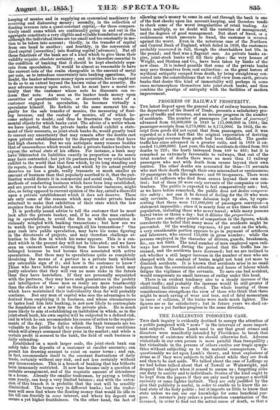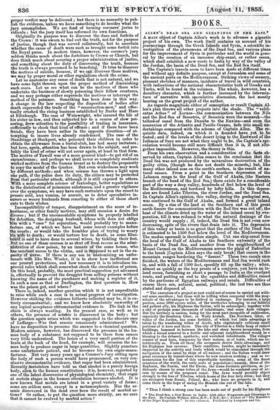THE DARLINGTON POISONING CASE.
Tsrrs dark inquiry is evidently destined to occupy the attention of a public pampered with " news" in the intervals of more import- taut subjects. Charles Lamb used to say that great crimes and disasters were manifestly intended by Providence to break that monotony of existence which we should otherwise feel. Adverse vicissitude in our own person is more painful than tranquillity ; but vicissitude in the persons of others excites our tragic sympa- thies without subjecting us to the material consequences. Un- questionably we act upon Lamb's theory, and treat explosions of crime as if they were subjects to talk about while they are fresh and then to be cast aside. We talked about the ease of Laffarge as we had before talked about that of Tawell or Wainwright, and dropped the subject when it ceased to amuse us ; forgetting alike our duty to society and to individuals. Stories of the kind ought to be kept from the papers if they are only used to pamper a morbid' curiosity or some lighter instinct. They are only justified by the plea that publicity is useful, in order to enable us to know the ac- tual state of the body politic ; but it imports us little to know that state unless we can use our knowledge for some beneficial pur-
se. A coroner's jury orders a post-mortem examination of the deceased, in order to find out the actual cause of death, so that a
proper verdict may be delivered ; but there is no necessity to pub- lish the evidence, unless we have something to do besides what the jury accomplishes. We are fond of turning coroners' juries to ridicule ; but the jury itself has reformed its own functions. Originally its purpose was to discover the dues and forfeits of the Crown: it was sworn to find out the truth, not for the purpose of justice, though that was served collaterally, but to ascertain whether the cause of death were such as brought some forfeit into the Royal purse. In modern times, however, the coroner's jury seldom thinks much about the forfeiture to Crown or Church, but does think much about securing a proper administration of justice, and something about the duty of discovering the truth, because
the truth is always presumed to be beneficial. It tries to discover the motives of suicide, because, if we can discover those motives, we may by proper moral or other regulations check the crime.
Let us anatomize any cause of death that is not natural, and we have some light thrown upon the proper method of diminishing such cases. Let us see what can be the motives of those who undertake the business of slowly poisoning their fellow creatures, and we may perhaps either supersede the motives or interrupt the method of the poisoner. Something has been done in this way. A change in the law respecting the disposition of bodies after death superseded the trade of the "resurrection-men," and effec- tually crushed the rising business established by Burke and Hare at Edinburgh. The case of Wainwright, who insured the life of his sister-in-law, and then subjected her to a course of slow poi- soning, drew attention to the possibility of trading in insurance, sufficiently to check that kind of offence ; and if there have been frauds, they have been rather in the opposite direction—of at- tempting to insure lives already condemned. The case of the Standrings at Stockport, who poisoned their children in order to obtain the allowance from a burial-club, has had many imitators ; but here, again, attention has been drawn to the subject, and pro- bably the kind of crime will not occur again, at least in that form. The motive of Tawell was of a more general kind—to get rid of an encumbrance; and perhaps we shall never so completely eradicate wicked motives from the human breast as to destroy the propensity to copy the model of the Quaker. But even wickedness may work by different methods ; and when science has thrown a light upon
one path, if the police does its duty, the citizen may be protected from that particular attack, although it is still exposed to others.
With a more complete science of toxicology, better regulations as
to the distribution of poisonous substances, and a greater vigilance over the symptoms, we may have such restraints upon the resort to
prussic acid, nu m vomiea, or arsenic, as to deter speculative in- surers or weary husbands from resorting to either of those short cuts to their wishes.
Incompatibility of temper, disappointment on the score of in- heritance, or other family motives, may still occasion a desire for divorce ; but if the nnconcealable symptoms be properly labelled Mr detection, the designing husband, whose wife does not oblige him with a "case" for separation, would probably try to manu- facture one, of which we have had some recent examples before the courts; or would take the humbler plan of trying to weary his wife to death; or would torture her to death, as some Blue-
bfd said to have done to several wives, by tickling their feet. But no one of these courses is so shut off from rescue as the admi- Mitration of slow poison, by an inmate of the same house, who
has constant access to the victim, and is pposed to act in the ca- pacity Of nurse. If there is any use in anatomizing an unfor- tunate WM like Mrs. Wooler, it is to show bow ineffectual are our present protections, and how necessary it is to introduce im- proved rules which shall somewhat check the circulation of poison. On this head, probably, the most practical suggestion yet advanced is, effectually to prevent the druggist from selling poisons without knowing the name of the purchaser and making a register of it. In such a case as that at Darlington, the first question is, How was the poison got, and where ? There is, indeed, another question which it is not unprofitable to raise while such a case is in actual progress of investigation.
However striking the evidence hitherto collected may be, it is en- tirely circumstantial; and we know how absolutely unworthy of any logical acceptance circumstantial evidence is. The link in the chain is always wanting. In the present case, as well as in others, the presence of arLehic is discovered in the body ; but the question again arises which was suggested in the obscure case of Laffarge— Was that arsenic consciously administered ? We have no disposition to presume the answer to a chemical question. Modern science, however, has discovered the presence in the hu- man body of a substance not supposed to be there from causes very little understood. The lesion of a very small portion of the brain at the back of the head, for example, will occasion the hu- man body to produce sugar in large quantities. Slightly puncture some unfortunate patient, and he becomes his own sugar-manu- facturer. Not very many years ago a Coroner's Jury sitting upon the body.of such a person would have pronounced, on very con- clusive circumstantial evidence, that sugar had been administered. Recently teetotalers have told us that alcohol is a purely foreign body, alien to the human constitution : it is, however, reported by one of the latest discoveries of physiological chemistry, that sugar at certain stages in the human circulation becomes alcohol. It is now known that metals are latent in a great variety of forms ; some are seldom seen, except in a metamorphosis. Has the ar- senic discovered in the dead ever been the result of morbid ac- tions? Or rather, to put the question more strictly, are we sure that it cannot be evolved by morbid action ?



























 Previous page
Previous page